
The Lockeford Plant Materials Center is a 106-acre facility located in the Central Valley of California and is the only PMC within the state. There are 27 PMCs around the country, with each one serving a specific ecological and geographic area. The CAPMC addresses the resource concerns within the Mediterranean climate areas of California. We work with NRCS field offices, public agencies, universities, conservation organizations, tribes, commercial seed producers and nurseries.
All of the studies and demonstrations conducted at the Lockeford Plant Materials Center during 2016/17 are in support of developing science based information that will be helpful for supporting conservation in California. The PMC develops plant technology for addressing resource concerns, which in California include soil health and air quality, and water-use efficiency for water quality and quantity.
PMC Trials for 2016/17
Studies conducted this year at the PMC include:
- National Cover Crop Adaptation Trial (1st year) – replicated study with 59 cultivars from 8 cover crop species to assess adaptation at 27 PMCs across the country (Figure 1).
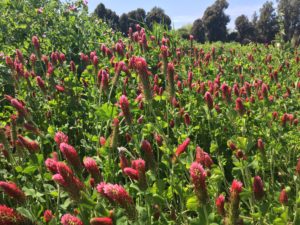
Figure 1
National Adaptation Cover Crop Study. Cultivars included clover, oats, cereal rye, radish, vetch and winter pea planted in randomized blocks, with 4 replications. - Moisture Sensor Demonstration (2nd year) – compare soil-water changes in the presence and absence of cover crops (Figure 2).
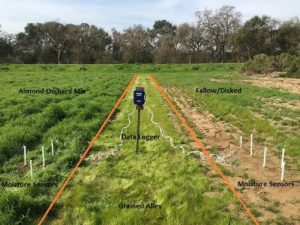
Figure 2
The Moisture Sensor Demonstration is collecting data under an almond orchard mix cover crop planted in 2011, and a fallow/disked area. - Compost on Rangeland Trial (2nd year) – replicated study of compost application to degraded rangelands (Figure 3).
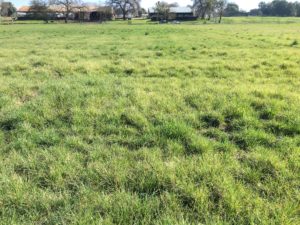
Figure 3
Compost was applied in fall of 2016 to the Compost on Rangeland Trail. Plots will be monitored for changes in plant composition and soil health. - Drought Tolerant Cover Crop Trial (3rd year) – replicated study evaluating drought tolerant species.
- Winterkill Cover Crop Demonstration (1st year) – evaluating warm season cover crop growth and termination (Figure 4).
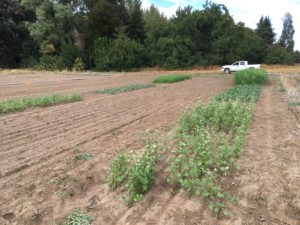
Figure 4
Winterkill Trail with summer cover crops planted every 2 weeks in August and September. Buckwheat in foreground. - Cover Crop Component Demonstration (6th year) – examples of different commercially available cover crops (Figure 5).
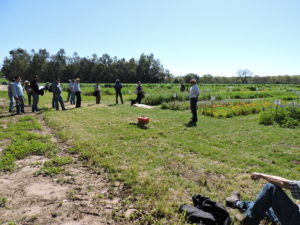
Figure 5
Cover Crop Component Demonstration with ten mixes and 50 individual species plots of cover were discussed during the PMC Open House.
Demonstration Plantings – Wildlife Resources and Pollinator Habitat
Demonstrations plantings at the Lockeford PMC were established in partnership with the Xerces Society.
- Pollinator Hedgerows – Four demonstration hedgerows were planted at the PMC in 2009 and are intended to serve as examples for step-by-step pollinator hedgerow installation and management (Figure 6).
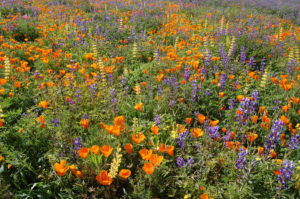
Figure 6
Pollinator Mix Planting at the PMC - Pollinator Meadows– Several pollinator meadows were planted at the PMC in 2011 and 2013 to demonstrate and test wildflower seed mixes for establishment success, native bee attractiveness, and compatibility with agricultural practices in California (Figure 7).
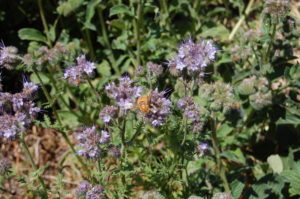
Figure 7
Bumble Bee visiting lacey phacelia in a pollinator planting at the PMC.
Outreach – Presentations, Trainings and Tours
The PMC is also used as a training and outreach site. Please let us know if you would like to schedule a tour or training event.
Annual PMC Open House will be held on Wednesday April 5, 2017 from 10am – 3pm
Attendance is typically over a 100 participants, so please don’t forget to RSVP (Margaret.Smither-Kopperl@ca.usda.gov).
- Participants include producers, NRCS and RCD employees and other members of the public.
- This year we will be discussing Water Management in California and Cover Crop Benefits with speakers from the NRCS State Specialists, California Soil Health Network, and local seed and soil moisture monitoring representatives.
- In the past, sessions have focused on soil health and cover crop studies with speakers from California Soil Health Network, Sustainable Conservation, UC Davis, and local seed companies, as well as a PMC tour and discussion on pollinator plantings and their long term soil health benefits (Figure 8).
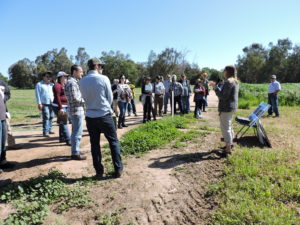
Figure 8
Alyssa DeVincentis, Graduate Student in Water Management from Sam Sandoval’s Laboratory at UC Davis gives a presentation on her research on cover crops and water use at the PMC Open House.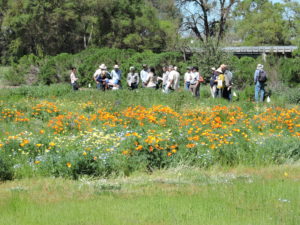
Commercial Pollinator Mixes tour at the PMC Open House.
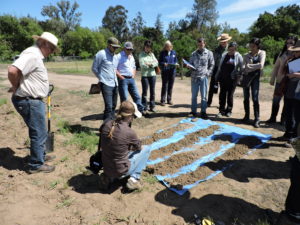
Soil Health comparison under different types of pollinator plantings at the PMC Open House.
Activities at the PMC depend upon our partnerships and collaborations with other groups and these continue to expand. Active partners during 2016 included the East Stanislaus and San Joaquin Resource Conservation Districts, and non-profit organizations including the Xerces Society, Sustainable Conservation, the Intertribal Agriculture Council and the Lockeford Protection District.
Contact Information
For more detailed information, contact the CAPMC or email: Margaret.Smither-Kopperl@ca.usda.gov
Lockeford Plant Materials Center
21001 N. Elliott Road, (P.O. Box 68)
Lockeford, CA 95237
Tel: 209 727 5319
Have something interesting to say? Consider writing a guest blog article!
To join the Lodi Growers email list, send an email to stephanie@lodiwine.com with the subject “grower email subscribe” or click on “join our email list” to the right.
To receive Lodi Grower news and event promotions by mail, send your contact information to stephanie@lodiwine.com or call 209.367.4727.
For more information on the wines of Lodi, visit the Lodi Winegrape Commission’s consumer website, lodiwine.com.

